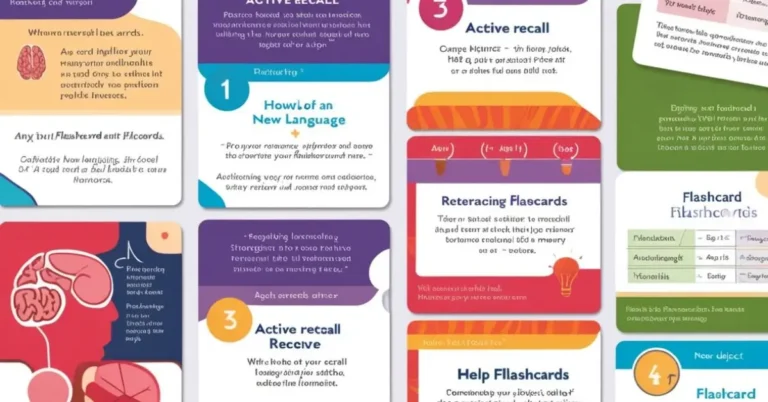Flashcards are an age-old yet highly effective tool for enhancing memory and recall. They rely on active recall, a process that strengthens the brain’s ability to retrieve information. Unlike passive learning methods such as rereading or highlighting, flashcards engage the mind by requiring focused retrieval, which improves both retention and understanding.
Flashcards work for any subject—whether you’re mastering a new language, preparing for exams, or diving into technical skills. Their versatility and efficiency make them an essential part of any study strategy, helping you break down complex topics and tackle them step by step.
Benefits of Using Flashcards for Recall
Flashcards offer a range of advantages that make them a go-to tool for learners:
- Active Engagement: Promotes memory retention by encouraging focused mental effort.
- Simplified Concepts: Breaks complex information into manageable pieces.
- Customizable: Tailor flashcards to fit your learning style and subject matter.
- Portable: Study on the go with physical cards or digital tools.
- Reinforced Repetition: Helps embed information into long-term memory through regular review.
How to Create Effective Flashcards
The effectiveness of flashcards depends on their design. Follow these steps to create impactful flashcards:
- One Concept Per Card: Keep each card focused on a single topic to avoid confusion.
- Use Clear Questions and Answers: Frame concise, straightforward questions on one side and answers on the other.
- Incorporate Visuals: Add diagrams, images, or colors to enhance memory retention.
- Write in Your Own Words: Personalizing content improves understanding and recall.
- Shuffle Regularly: Avoid memorizing the sequence of cards instead of the content.
Leveraging Technology: A New App to Convert Notes to Flashcards
Modern technology has revolutionized the way we study, making it easier than ever to create and use flashcards. A new app to convert notes to flashcards can save time and streamline your study process. These apps allow you to upload your notes or summaries, automatically generating flashcards in a question-and-answer format.
For instance, if your notes say, “The heart pumps blood through the circulatory system,” the app can create a card with the question, “What is the function of the heart?” on one side and “It pumps blood through the circulatory system” on the other. This automation ensures you spend more time reviewing and less time preparing. Popular apps like Quizlet and Anki include additional features like multimedia elements and spaced repetition schedules, further enhancing their utility.
Spaced Repetition: The Key to Retention
To maximize the effectiveness of flashcards, incorporate spaced repetition into your study routine. Spaced repetition involves reviewing material at increasing intervals, which reinforces knowledge and prevents forgetting.
Apps like Anki and Brainscape use algorithms to schedule flashcard reviews based on how well you remember each concept. By focusing more on challenging topics and spacing out familiar ones, you optimize your study time and improve long-term retention.
Traditional vs. Digital Flashcards
Choosing between physical and digital flashcards depends on your preferences and needs. Both options have unique benefits:
Traditional Flashcards:
- Tactile Learning: Writing and handling physical cards reinforces memory.
- No Digital Distractions: Provides a focused, screen-free study environment.
- Customizable: Easy to personalize with handwriting and colors.
Digital Flashcards:
- Convenience: Accessible anytime on smartphones, tablets, or computers.
- Advanced Features: Add multimedia elements like images, videos, and audio.
- Progress Tracking: Monitor performance and focus on weak areas.
- Spaced Repetition Integration: Automate review schedules for better retention.
Combining both methods can provide a balanced approach, offering tactile engagement and technological efficiency.
How to Incorporate Flashcards into Your Study Routine
Flashcards are versatile and can fit into any study plan. Here’s how to use them effectively:
- Set Daily Goals: Decide how many flashcards you’ll review each day.
- Use Short Sessions: Dedicate 15–20 minutes to focused flashcard reviews.
- Mix Topics: Rotate between subjects to keep study sessions engaging.
- Combine Methods: Pair flashcards with quizzes, notes, or group discussions.
- Track Your Progress: Monitor improvement and adjust focus areas as needed.
Flashcards Beyond the Classroom
Flashcards are not limited to academic use—they’re equally valuable for personal and professional development. Here are some ways they can be applied beyond school:
- Learning a Language: Memorize vocabulary, grammar rules, and phrases.
- Preparing for Certifications: Retain industry-specific knowledge and terminology.
- Mastering New Skills: Break down processes and concepts for hobbies or technical training.
Their adaptability makes flashcards a tool for lifelong learning and continuous growth.
Tips for Maximizing Flashcard Efficiency
To ensure your flashcards deliver the best results, keep these tips in mind:
- Test Yourself Actively: Try answering each card before flipping it over.
- Shuffle Regularly: Avoid memorizing card sequences instead of content.
- Use Mnemonics: Create memory aids like acronyms or rhymes to make concepts stick.
- Review Consistently: Regular practice is essential for long-term retention.
- Leverage Technology: Use apps to automate reviews and track progress.
Conclusion:
Flashcards are a timeless and effective way to boost recall and improve study efficiency. By leveraging tools like apps that convert notes into flashcards, incorporating spaced repetition, and integrating flashcards into your routine, you can achieve your learning goals with ease.
Whether you choose traditional or digital formats, the key to success lies in consistent use and thoughtful application. Flashcards not only help you retain information effectively but also make learning more engaging and enjoyable. With flashcards as part of your study arsenal, you’ll be well on your way to mastering any subject and achieving better recall.

